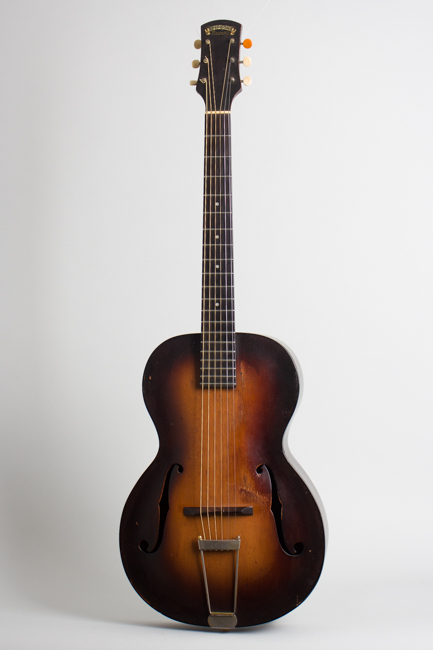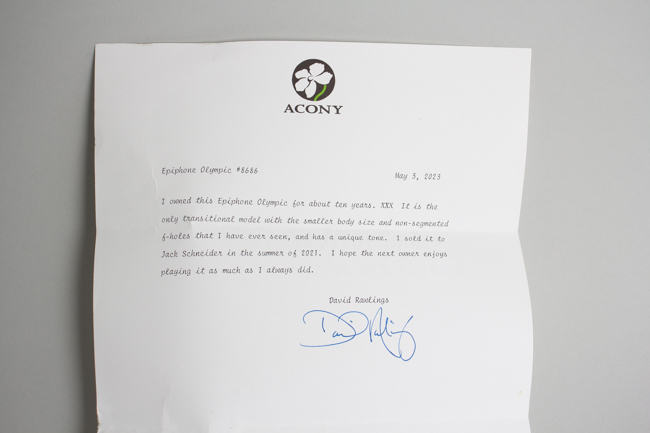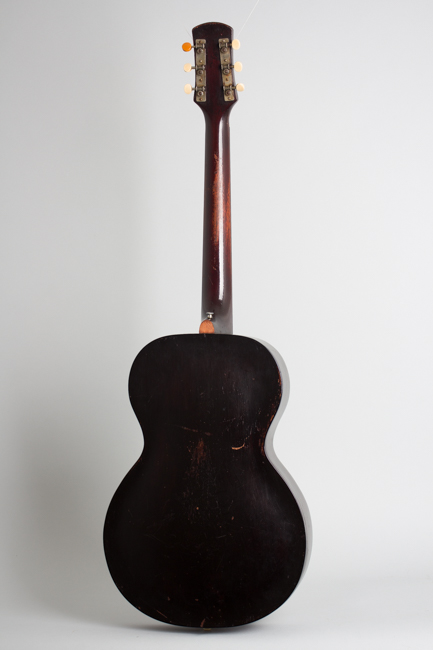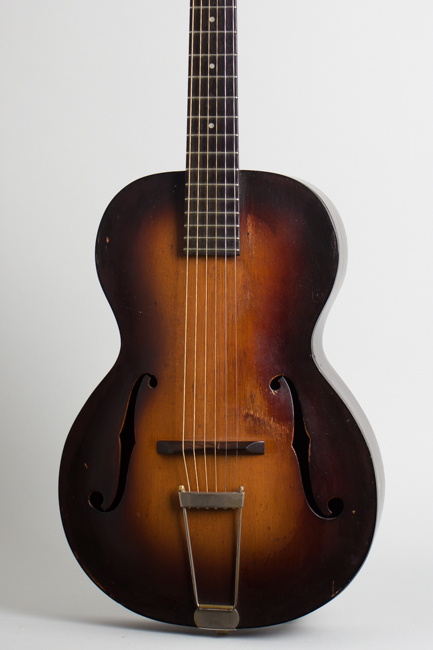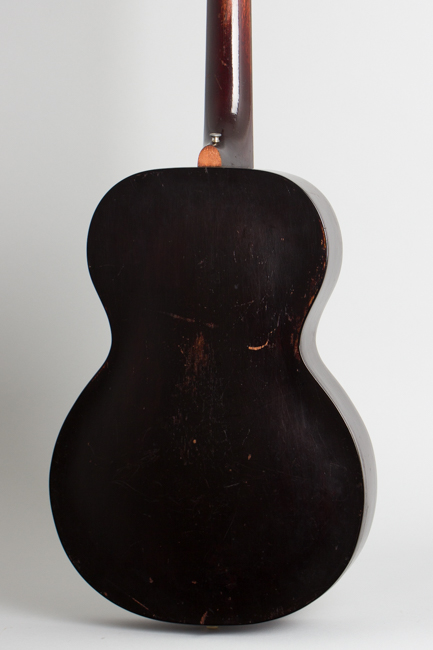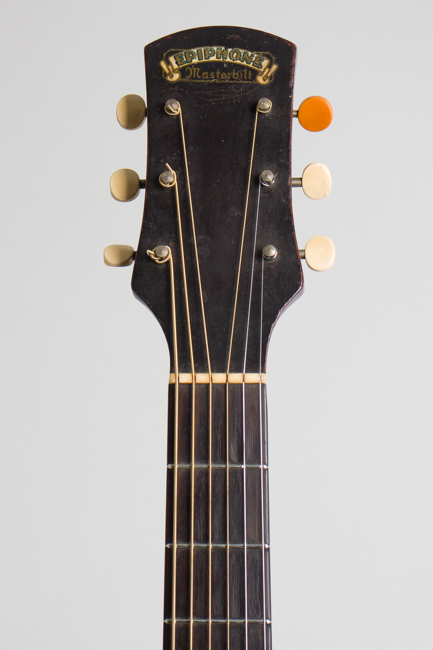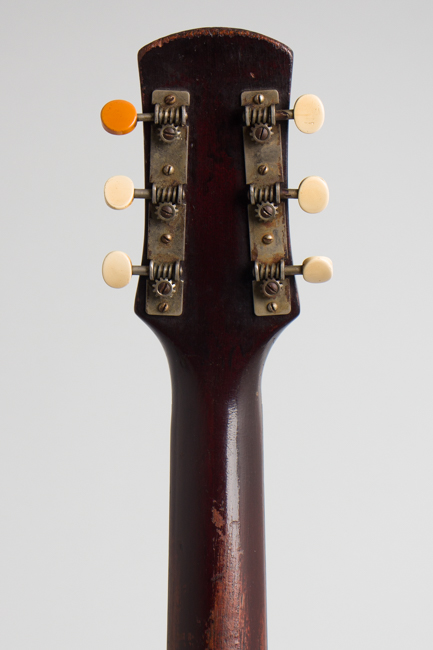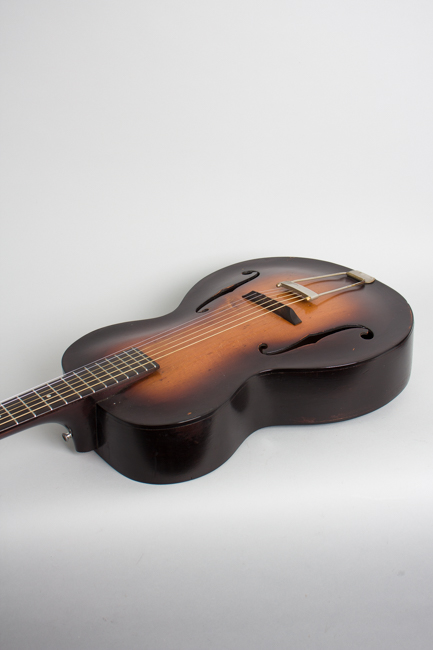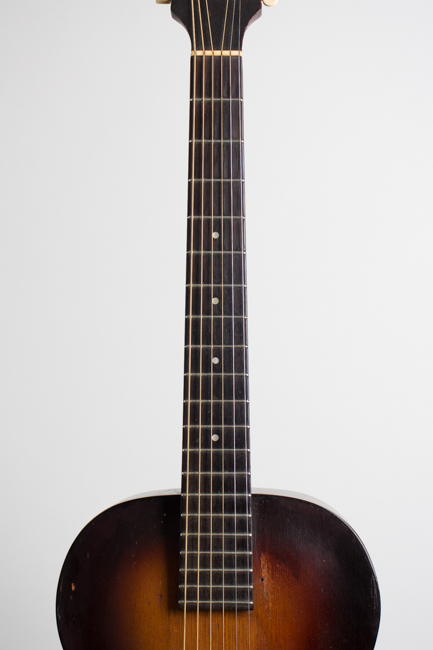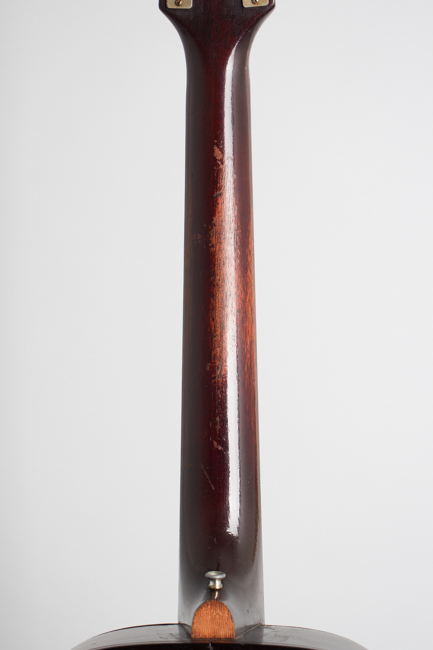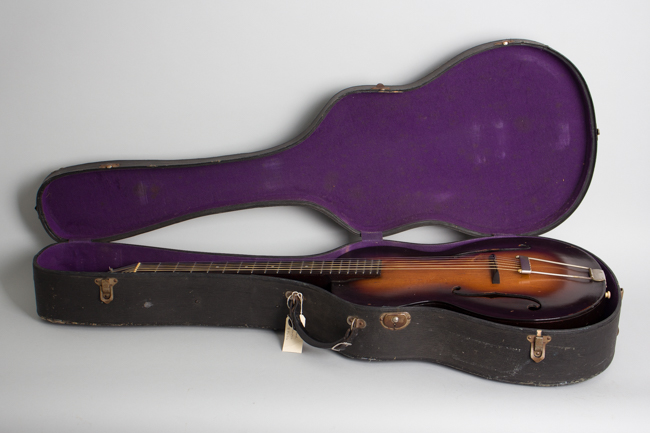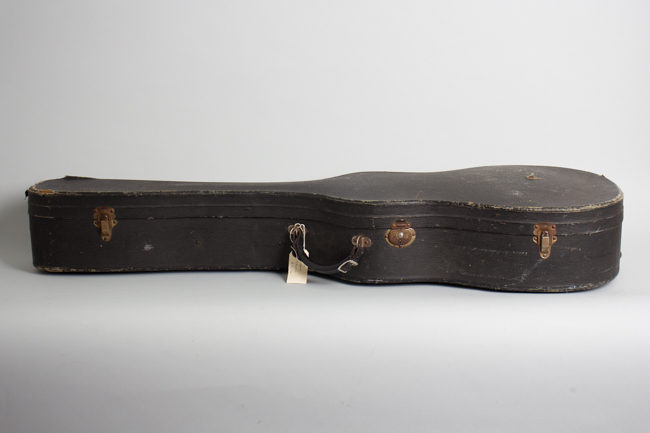Epiphone Olympic Previously Owned by David Rawlings Arch Top Acoustic Guitar (1935)
This item has been sold.
Item # 11541
Prices subject to change without notice.
Epiphone Olympic Previously Owned by David Rawlings Model Arch Top Acoustic Guitar (1935), made in New York City, serial # 8686, sunburst top, dark back and sides finish, mahogany back and sides, spruce top; mahogany neck with rosewood fingerboard, original black hard shell case.
There are few instrument/player combinations as revered and influential today as David Rawlings and the Epiphone Masterbilt Olympic. This extremely plain, small-bodied and previously forgotten model has become one of the most requested of pre-war archtops, due entirely to this one connection. This guitar was previously one of Rawlings' personal instruments, set up to his performance specs, later sold to Nashville cohort Jack Schneider.
The Olympic was right at the bottom of the original 1931 Epiphone Masterbilt line, about as simple an archtop guitar as it was possible to make. The model was introduced at a whopping $30 list price; the top-line Deluxe listed at $275. The body was originally a very small 13" wide, increased by 1935 to a slightly more generous 13 5/8". The body edges have inconspicuous dark single-layer binding, there is no ornament anywhere. The top is carved tight grain Adirondack spruce, worked quite thin contributing to the bright, punchy sound. The neck is slim for the period with a "rounded V' profile and a narrow (for 1935) 1 5/8" nut. The round-top headstock has an "Epiphone Masterbilt" banner decal and plain strip tuners with plastic buttons.
While as plain as possible the Olympic boasted several advantages over similar Gibson guitars of the time. The long 25 1/2" scale neck has a cantilevered fingerboard suspended over the top, enhancing tone and power giving this small arch top a formidable voice for its size. At the time even the largest Gibson archtops still had a shorter 24 3/4" scale. This Olympic is a rare transitional version with newer-style open (non-segmented) F-holes on the smaller 13 5/8" body; not long after it was made the instrument was changed to a larger 15" body. Despite their budget status original pre-1936 Masterbilt Olympics are extremely rare, especially this exact 1935 variant.
This guitar has Nashville luthier Joe Glazer's unique modification done to all Rawlings' Olympics; a hand made, solid compensating bridge replacing the original adjustable style. In this case it is carved from a block of rosewood instead of ebony. The guitar includes a hand-signed letter from David Rawlings attesting to his 10-year ownership of the guitar, and wishing the next owner well. This also confirms it was sold to fellow Nashville picker Jack Schneider, from whom we received the instrument directly.
The recent notoriety of this model even led the modern Epiphone company to re-issue it not too long ago but those are of course not a patch on the 1935 original. Needless to say this is an exceptionally rare opportunity to obtain an authentic Epiphone Olympic owned and used by the artist who is the only reason most players today have ever heard of this instrument.
Overall length is 40 1/2 in. (102.9 cm.), 13 5/8 in. (34.6 cm.) wide at lower bout, and 3 1/2 in. (8.9 cm.) in depth, measured at side of rim. Scale length is 25 1/2 in. (648 mm.). Width of nut is 1 5/8 in. (41 mm.).
This guitar shows a LOT of wear overall, a real heavily played relic. There are scratches, dings and dents overall with a swath of pick wear on the top just in front of the bridge. The back and sides have had an ancient and sloppy dark overfinish added, which has spilled over onto the edges of the top in spots. This later finish is partially worn away again in places, and appears many decades old. The neck finish remains original and has significant wear to the wood on the back, with a great played-in feel. The headstock finish is fully original with some wear and general scruffiness but the decal is better preserved than many. The tuners are original with one noticeable replaced button, the pickguard and heelcap are missing and a strap button is added to the heel.
There is some play wear to the frets and fingerboard; the frets appear old but probably not original. The guitar has a medium action, 3/16" bass and 2/16" treble and the set up has not been altered from Rawlings' specs. You won't get the "real" sound out of this guitar without putting some push into the playing, but it is there. Though never Rawlings' main Olympic, this guitar has been hand-tuned as close as possible and offers a very similar sound, featuring the unmistakable oddly reverberant tone and powerful cut for which his #1 Olympic is duly venerated. The guitar lives in a period (slightly oversize) hard case with the studio ID tag on the handle and is accompanied by a hand-signed letter from Rawlings confirming his prior ownership. Very Good + Condition.
There are few instrument/player combinations as revered and influential today as David Rawlings and the Epiphone Masterbilt Olympic. This extremely plain, small-bodied and previously forgotten model has become one of the most requested of pre-war archtops, due entirely to this one connection. This guitar was previously one of Rawlings' personal instruments, set up to his performance specs, later sold to Nashville cohort Jack Schneider.
The Olympic was right at the bottom of the original 1931 Epiphone Masterbilt line, about as simple an archtop guitar as it was possible to make. The model was introduced at a whopping $30 list price; the top-line Deluxe listed at $275. The body was originally a very small 13" wide, increased by 1935 to a slightly more generous 13 5/8". The body edges have inconspicuous dark single-layer binding, there is no ornament anywhere. The top is carved tight grain Adirondack spruce, worked quite thin contributing to the bright, punchy sound. The neck is slim for the period with a "rounded V' profile and a narrow (for 1935) 1 5/8" nut. The round-top headstock has an "Epiphone Masterbilt" banner decal and plain strip tuners with plastic buttons.
While as plain as possible the Olympic boasted several advantages over similar Gibson guitars of the time. The long 25 1/2" scale neck has a cantilevered fingerboard suspended over the top, enhancing tone and power giving this small arch top a formidable voice for its size. At the time even the largest Gibson archtops still had a shorter 24 3/4" scale. This Olympic is a rare transitional version with newer-style open (non-segmented) F-holes on the smaller 13 5/8" body; not long after it was made the instrument was changed to a larger 15" body. Despite their budget status original pre-1936 Masterbilt Olympics are extremely rare, especially this exact 1935 variant.
This guitar has Nashville luthier Joe Glazer's unique modification done to all Rawlings' Olympics; a hand made, solid compensating bridge replacing the original adjustable style. In this case it is carved from a block of rosewood instead of ebony. The guitar includes a hand-signed letter from David Rawlings attesting to his 10-year ownership of the guitar, and wishing the next owner well. This also confirms it was sold to fellow Nashville picker Jack Schneider, from whom we received the instrument directly.
The recent notoriety of this model even led the modern Epiphone company to re-issue it not too long ago but those are of course not a patch on the 1935 original. Needless to say this is an exceptionally rare opportunity to obtain an authentic Epiphone Olympic owned and used by the artist who is the only reason most players today have ever heard of this instrument.
Overall length is 40 1/2 in. (102.9 cm.), 13 5/8 in. (34.6 cm.) wide at lower bout, and 3 1/2 in. (8.9 cm.) in depth, measured at side of rim. Scale length is 25 1/2 in. (648 mm.). Width of nut is 1 5/8 in. (41 mm.).
This guitar shows a LOT of wear overall, a real heavily played relic. There are scratches, dings and dents overall with a swath of pick wear on the top just in front of the bridge. The back and sides have had an ancient and sloppy dark overfinish added, which has spilled over onto the edges of the top in spots. This later finish is partially worn away again in places, and appears many decades old. The neck finish remains original and has significant wear to the wood on the back, with a great played-in feel. The headstock finish is fully original with some wear and general scruffiness but the decal is better preserved than many. The tuners are original with one noticeable replaced button, the pickguard and heelcap are missing and a strap button is added to the heel.
There is some play wear to the frets and fingerboard; the frets appear old but probably not original. The guitar has a medium action, 3/16" bass and 2/16" treble and the set up has not been altered from Rawlings' specs. You won't get the "real" sound out of this guitar without putting some push into the playing, but it is there. Though never Rawlings' main Olympic, this guitar has been hand-tuned as close as possible and offers a very similar sound, featuring the unmistakable oddly reverberant tone and powerful cut for which his #1 Olympic is duly venerated. The guitar lives in a period (slightly oversize) hard case with the studio ID tag on the handle and is accompanied by a hand-signed letter from Rawlings confirming his prior ownership. Very Good + Condition.
